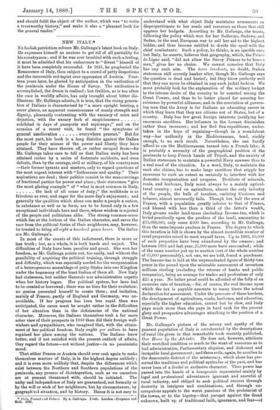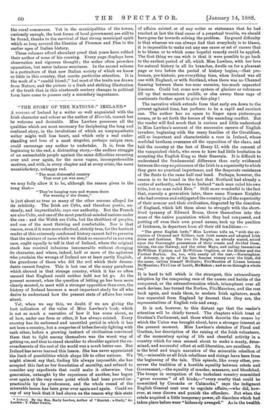NEW ITALY.* No foolish patriotism colours Mr. Gallenga's latest book
on Italy. He expresses himself as anxious to get rid of all partiality for his countrymen ; and if he was ever troubled with such a feeling, it must be admitted that his endeavours to " divest " himself of it have been completely successful. In 1841, he prophesied the Renascence of Italy, then subject to a crowd of petty despotisms and the inexorable red-tapist over-oppression of Austria. Four- teen years later, he gloried by anticipation in the unification of the peninsula under the House of Savoy. The unification is accomplished, the dream is realised ; but fruition, as is too often the case in worldly affairs, has only brought about bitter dis- illusions. Mr. Gallenga admits, it is true, that the rising genera- tion of Italians is characterised by "a more upright bearing, a surer glance, an apparent consciousness of manly strength and dignity, pleasantly contrasting with the vacancy of mien and dejection, with the uneasy look of suspiciousness exhibited in days of passports and espionage ;" and on the occasion of a recent visit, he found " the symptoms of general amelioration everywhere present." But for the most part, his book is a long diatribe against the Italian people for their misuse of the power and liberty they have attained. They have thrown off, or rather escaped from—for Mr. Gallenga takes care to tell us that Italian unity has been attained rather by a series of fortunate accidents, and even defeats, than by the courage, civil or military, of his countrymen —their former tyrants and masters, only to regard questions of the most urgent interest with "listlessness and apathy." Their aspirations are dead ; their politics consist in the manoeuvrings of fractional parties for power and place ; their statesmen "give the most glaring example" of "what is most common in Italy, the lack of all sense of duty;" the multitude is as frivolous as ever, and eager for the mere day's enjoyment ; and generally the qualities which alone can make a people a nation, in substance as well as in form, are to be found only in a few exceptional individuals here and there, whose wisdom is rejected of the people and politicians alike. The strong common-sense which lies at the bottom of the Italian character, and saves the race from the political furies of their neighbours, may, however, be trusted to bring all right a hundred years hence. The italics are Mr. G-allenga's.
In most of the counts of this indictment, there is more or less truth ; but, as a whole, it is both harsh and unjust. The difficulties of Italy have been peculiar and great. She won her freedom, as Mr. Gallenga points out, too easily, and without the possibility of acquiring the political training, through struggle and difficulty, which was especially needed for the reorganisation of a heterogeneous assemblage of petty States into one Kingdom under the hegemony of the least Italian of them all. New Italy had statesmen, but neither Generals nor administrative experts when her history began. Her political system, her laws had to be created or borrowed ; there was no time for their evolution ; no genius presented himself to create them ; and imitation, mainly of France, partly of England and Germany, was un- avoidable. If her progress has been less rapid than was anticipated, the cause must be sought rather in the difficulties of her situation than in the deficiencies of the national character. Moreover, the Italians themselves took a far more sober view of their prospects in 1860 than did their foreign well- wishers and sympathisers, who imagined that, with the attain- ment of her political freedom, Italy ought per saltunt to have regained her place among the nations. The Italians knew better, and if not satisfied with the present outlook of affairs, they regard the future—not without justice—in no pessimistic mood.
That either France or Austria should ever seek again to make
themselves masters of Italy, is in the highest degree unlikely ; and it is even more unlikely that, despite the differences which exist between the Northern and Southern populations of the peninsula, any process of disintegration, such as we ourselves are at present threatened with, should be initiated. The
unity and independence of Italy are guaranteed, not formally or by the will or wish of her neighbours, but by circumstances, by geographictl situation, and by history. Hence it is not easy to
• Italy, Present end Future. By A. Galkngs. 2 vols. London : Chapman and liall. 1587.
understand with what object Italy maintains armaments so disproportionate to her needs and resources as those that still oppress her budgets. According to Mr. Gallenga, she trusts, following the policy which won for her Solferino, Sadowa, and Sedan, in the next European war to sell her aid to the highest bidder, and thus become entitled to divide the spoil with the chief combatants. Such a policy, he thinks, is an ignoble one ; but Italy, he asserts, believes that geography, which, the Prince de Ligne said, "did not allow the Savoy Princes to be honest men," gives her no choice. We cannot conceive that Italy has any such aim. The terre irredente, no doubt, Italian statesmen still secretly hanker after, though Mr. Gallenga says the question is dead and buried ; but they know perfectly well that they can never be obtained in any such jackal fashion. We must probably look for the explanation of the military budget to the intense desire of the country to be counted among the Great Powers, and thus to be better placed for assuring her existence by powerful alliances, and in the conviction of govern- ing men that the Army is for Italians an educating career in which they learn that they are citizens not of States, but of a country. Italy has few great foreign interests justifying her enormous sacrifices. Her influence in the Levant diminishes rather than increases ; and her Red Sea expeditions, under- taken in the hope of regaining—though in a roundabout way—her authority in the Mediterranean, tend, visibly enough, to no such result. Nevertheless, she can hardly afford to see the Mediterranean turned into a French lake ; it is probably a necessity of the geographical position of the peninsula to keep French hands off Tripoli, and the anxiety of Italian statesmen to maintain a powerful Navy answers thus to a real need of the situation. In a word, Italy, to maintain the rank she claims, has to make large sacrifices that cripple her resources to such an extent as seriously to interfere with her domestic reorganisation and progress. Destitute of minerals, coals, and harbours, Italy must always be a mainly agricul- tural country ; and on agriculture, almost the only industry of the people, the bulk of taxation, omitting Customs and tobacco, almost necessarily falls. Though but half the area of France, with a population greatly inferior to that of France, and blessed with less than a third of the latter'e wealth, Italy groans under land-taxes (including Income-tax, which is levied practically upon the produce of the land), amounting to £15,688,000, only some £400 less, according to Mr. Gallenga, than the same imposts produce in France. The degree to which this taxation is felt is shown by the almost incredible number of rural properties seized to meet unpaid taxes. Up to 1883, 40,000 of such properties have been abandoned by the owners ; and between 1833 and last year, 25,000 more have succumbed ; while of the same number put up to auction (out of the whole number of 65,000 presumably), not one, we are told, found a purchaser. The Income-tax is laid at the unprecedented figure of thirty-two pence in the pound upon the miserable assessment of seventeen millions sterling (excluding the returns of banks and public companies), being an average for trades and professions of only 225 a year. No better proof could be afforded of the folly of an excessive rate of taxation,—for, of course, the real income upon which the tax is payable amounts to many times the actual declaration for assessment. Under the pressure of these burdens,
the development of agriculture, roads, harbours, and education, especially the higher education, cannot but be slow, and Italy pays much more than she pays in hard cash for the present glory and prospective advantages attaching to the position of a Great Power.
Mr. Gallenga's picture of the misery and apathy of the peasant population of Italy is corroborated by the descriptions of rural life given in that remarkable book recently published, Our Home by the Adriatic. He does not, however, attribute their wretched condition so much to the want of resources as to bad administration, Parliamentary cliquism, and dishonest and incapable local government ; and these evils, again, he ascribes to the democratic distrust of the aristocracy, which alone has pre- served the traditions and political aptitudes of the past, and has never been of a feudal or exclusive character. Thus power has passed into the hands of a bourgeoisie represented mainly by legal and professional adventurers ignorant and scornful of rural industry, and obliged to seek political success through dexterity in intrigues and combinations, and through un- scrupulous appeals to the worst passions of the proletariat of the towns, or to the bigotry—that parapet against the dread unknown, built up of traditional faith, ignorance, and fear—of
the rural communes. Yet in the municipalities of the towns, curiously enough, the best forms of local government are still to be found, thanks to the survival of that strong municipal spirit which so long assured the liberties of Florence and Pisa in the earlier ages of Italian history. These volumes afford abundant proof that years have robbed their author of none of his cunning. Every page displays keen observation and vigorous thought; the writer often provokes opposition, but never induces weariness. In the second volume is a portraiture of that new Italian society of which we know so little in this country, that merits particular attention. It is the work of a "candid friend;" but most of the traits are drawn from Nature, and the picture is a fresh and striking illustration of the truth that in this nineteenth century changes in political form have come to possess only a secondary importance.







































 Previous page
Previous page